
|
|
|
|
|
|
|
|
|
|
|


|
|
|
|
|
|
|
|
|
|
|
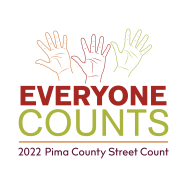
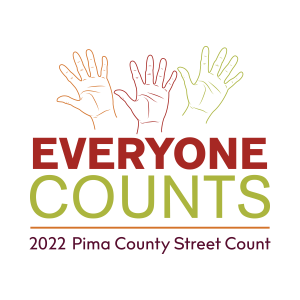 Volunteers Needed for 2022 Pima County Street Count
Volunteers Needed for 2022 Pima County Street Count
January 26, 2022 (6am-11am)
Register today at http://www.bit.ly/everyone2022
About the Street Count
Every year during the end of January, TPCH conducts an one-night count of people experiencing homelessness in Pima County. One component of the Point in Time Count is the street count, locally referred to as Everyone Counts! During the street count, teams of community volunteers work with service providers and street outreach teams to locate people who are unhoused and ask them a short series of survey questions. Survey responses help provide valuable information, direct support services and inform funding decisions in our community and beyond. Those sleeping in nightly shelters, emergency shelters, and transitional housing will be counted through the Homeless Management Information System (HMIS) the same night.
Finding people in our county who are unhoused in a single day is an enormous task! TPCH coordinates dozens of local agencies and recruits hundreds of volunteers to meet the goals of the project. Locations that provide services to people who may experience homelessness are surveying their clients. In addition, TPCH hosts a special Youth Count event for young people experiencing homelessness on the same day.
New This Year
In light of the COVID-19 pandemic, TPCH is taking several additional precautions to protect Street Count volunteers and our unhoused neighbors. All volunteers will be required to wear a face mask, practice social distancing to the greatest extent possible, and be fully vaccinated against COVID-19. Additionally, this year’s count will use an electronic survey application, easily accessible from volunteers’ smart phones or tablets, instead of paper forms.
Sign Up to Volunteer
Register to volunteer at http://www.bit.ly/everyone2022
Volunteer Training
All volunteers are required to participate in one Volunteer Training during one of the following times:
The training will give you an opportunity to learn:
This is a valuable opportunity to volunteer for a single day, show kindness to neighbors who are unhoused, and contribute to a count that influences services and funding. Please join us!
Questions? Please email everyonecounts@tpch.net
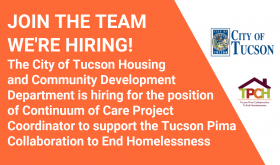

The City of Tucson Housing and Community Development Department is hiring the position of Community Services and Neighborhood Resources Project Coordinator (Continuum of Care). This position is a key staff in the Department’s Planning and Community Development Division and are responsible for providing administrative leadership and support to the Tucson Pima Collaboration to End Homelessness (TPCH).
The application period closes December 6, 2021.
Click here to review the job description and apply online.
TPCH is a community-based coalition of government entities, not-for-profit organizations, businesses, faith communities, volunteer groups, and community members working together to prevent and end homelessness in Tucson and throughout Pima County, Arizona. TPCH has a bold strategic plan centered on efforts to end chronic homelessness, reduce and abbreviate episodes of homelessness among all people, elevate the voices and authority of persons with lived and living experience of housing instability, and advance racial equity and housing justice in Southern Arizona.
Learn more about TPCH at www.tpch.net.
Click here to review TPCH’s Community Plan to Prevent and End Homelessness in Tucson/Pima County.
Ready to join the team?
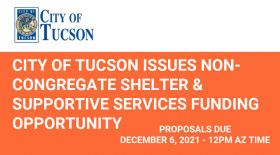
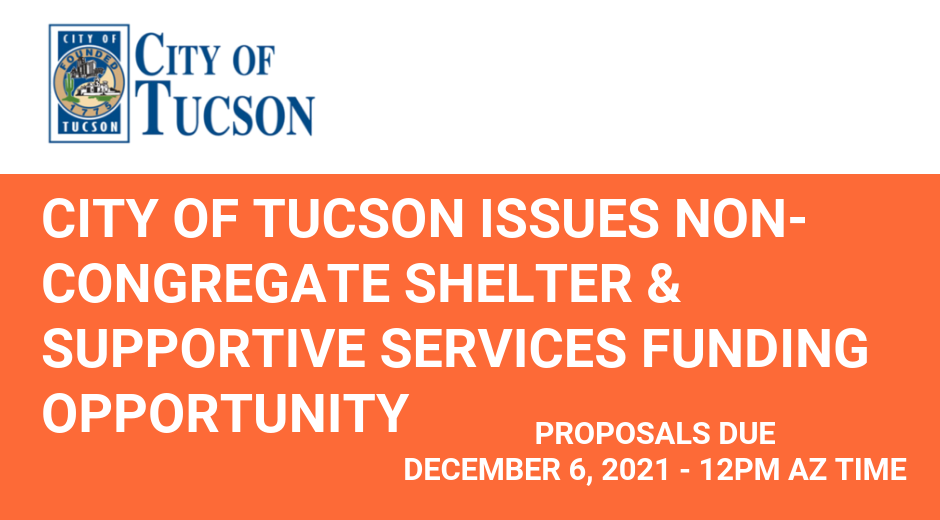
City of Tucson Issues Request for Proposals
Non-Congregate Shelter/Bridge Housing
Shelter Operations (Scope of Work 1) and Supportive Services (Scope of Work 2)
Responses Due: December 6, 2021, 12:00pm (Noon)
Download the full Request for Proposals with Attachments
Download the Mandatory Excel Budget Form
BACKGROUND
The City of Tucson has planned with the community to respond to the COVID-19 virus and heightened risk among unsheltered persons by supporting and funding efforts to provide housing and other services to persons experiencing or at imminent risk of experiencing homelessness. The City of Tucson has received supplemental funding through the CARES Act and American Rescue Plan Act to address emergent needs related to COVID-19 and homelessness. As a result of the COVID-19 health emergency, expanded shelter capacity is needed to reduce risk of health complications to vulnerable people experiencing unsheltered homelessness. To address this critical gap, the City of Tucson has purchased multiple properties for use as non-congregate shelter and has additional purchases currently underway.
Project funding will include American Rescue Plan State and Local Fiscal Recovery Funds, HOME American Rescue Plan, Emergency Solutions Grant – CARES Act, and/or other possible federal, state, and local sources. Selected applicants will be required to comply fully with applicable Federal requirements except where waivers of regular requirements have been obtained by the City of Tucson and authorized for use by the selected offeror(s) in writing by the City of Tucson.
Expectations may evolve based on changes in local infrastructure, infection rates, and community response to the ongoing COVID-19 pandemic. The selected offeror(s) will be required to work closely with community teams and adjust services as directed by the City of Tucson.
PRE-PROPOSAL CONFERENCE (November 29, 2021 – 9am-10:15am)
The City of Tucson shall conduct a virtual pre-proposal conference from 9:00am to 10:15am on Monday, November 29, 2021. All offerors are strongly encouraged to review this Request for Proposals in full and to attend the pre-proposal conference. Offerors will be provided an opportunity to ask specific questions related to this Request for Proposals and the scopes of work solicited during the pre-proposal conference.
Interested offerors should register for the pro-proposal conference at https://us02web.zoom.us/webinar/register/WN_Y9hYtyRsQ2iZZ3DdafhI_w.
SERVICES SOLICITED UNDER THIS REQUEST FOR PROPOSALS
The City of Tucson invites proposals from eligible not-for-profit entities with capacity to provide Non-Congregate Shelter Operations and Supportive Services at various non-congregate shelter facilities owned by the City of Tucson. The City of Tucson shall issue separate awards for Non-Congregate Shelter Operations and Supportive Services but will include a preference for offerors capable of offering both scopes of work at one facility and/or multiple scopes of work at multiple facilities.
FACILITIES INCLUDED IN THIS REQUEST FOR PROPOSALS
The City of Tucson intends to issue one or more funding awards for the Non-Congregate Shelter Operations and Supportive Services at the following facilities. Interested applicants may drive by the properties but may not enter the properties or approach tenants or current operators.
Wildcat Residence: 49-unit motel property located at 1701 N. Oracle Road in Tucson, Arizona.
Desert Cove Residence: 23-bedroom multi-structure property located at 1833 W. Anklam Road in Tucson, Arizona.
Oracle Residence: 18-unit motor lodge property located at 2445 N. Oracle Road in Tucson, Arizona.
Additional details regarding each facility are provided in Exhibit A – Facility Overview and Offeror Requirements provided as an attachment to this Request for Proposals.
SCOPES OF WORK
Pursuant to Federal funding guidelines, this Request for Proposals includes two distinct scopes of work. Separate awards will be issued for each scope of work; however, offerors are encouraged to submit applications for multiple scopes of work.
Scope of Work #1 – Non-Congregate Shelter/Bridge Housing Operations: Shelter Operations shall be funded using American Rescue Plan State and Local Fiscal Recovery Funds and/or other Federal, State, or local sources. Shelter Operations include basic shelter oversight and operations, intake, recordkeeping, and reporting, security and 24-hour supervision. The full scope of work outlining requirements of offerors is provided as Exhibit B – Non-Congregate Shelter/Bridge Housing Scope of Work and attached to this Request for Proposals.
Scope of Work #2 – Non-Congregate Shelter/Bridge Housing Supportive Services: Supportive services shall be funded using American Rescue Plan HOME (HOME-ARP) funds and/or other Federal, State, or local sources. Supportive services must be offered to all non-congregate shelter/bridge housing residents and may not be required to obtain or maintain non-congregate shelter/bridge housing residency. Required supportive services include case management, housing search assistance, meal or grocery assistance, and coordinated service linkages. Offerors may and are encouraged to additionally provide optional supportive services as defined in the Exhibit C – Non-Congregate Shelter/Bridge Housing Supportive Services and attached to this Request for Proposals.
FUNDING AVAILABLE
The City of Tucson has not established minimum of maximum request amounts. Offerors are advised to propose lean, competitive budgets which are prudent, reasonable, and necessary to deliver proposed services. Overall cost will be accounted for as a factor in selecting qualified offers. Offerors which commit leverage or matching funds through outside resources may be prioritized for selection.
The City of Tucson anticipates making one or more awards under this solicitation. Offerors may apply for up to the maximum amount described for each scope of work included in the application. The City of Tucson reserves the right to increase/decrease award budgets or to make no awards under this solicitation at its discretion.
Additional funds may become available at a later date to expand or continue the project beyond the initial project period. Project services may be budgeted for the performance period stated in each component’s scope of work; however, households should be exited to self-sufficiency or longer-term housing subsidies/services as soon as possible.
QUESTIONS REGARDING THIS SOLICITATION
All questions regarding this solicitation should be emailed to jason.thorpe@tucsonaz.gov. Please allow up to two business days for a response.
APPLICATION MATERIALS
Download the full Request for Proposals with Attachments
Download the Mandatory Excel Budget Form
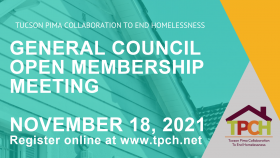
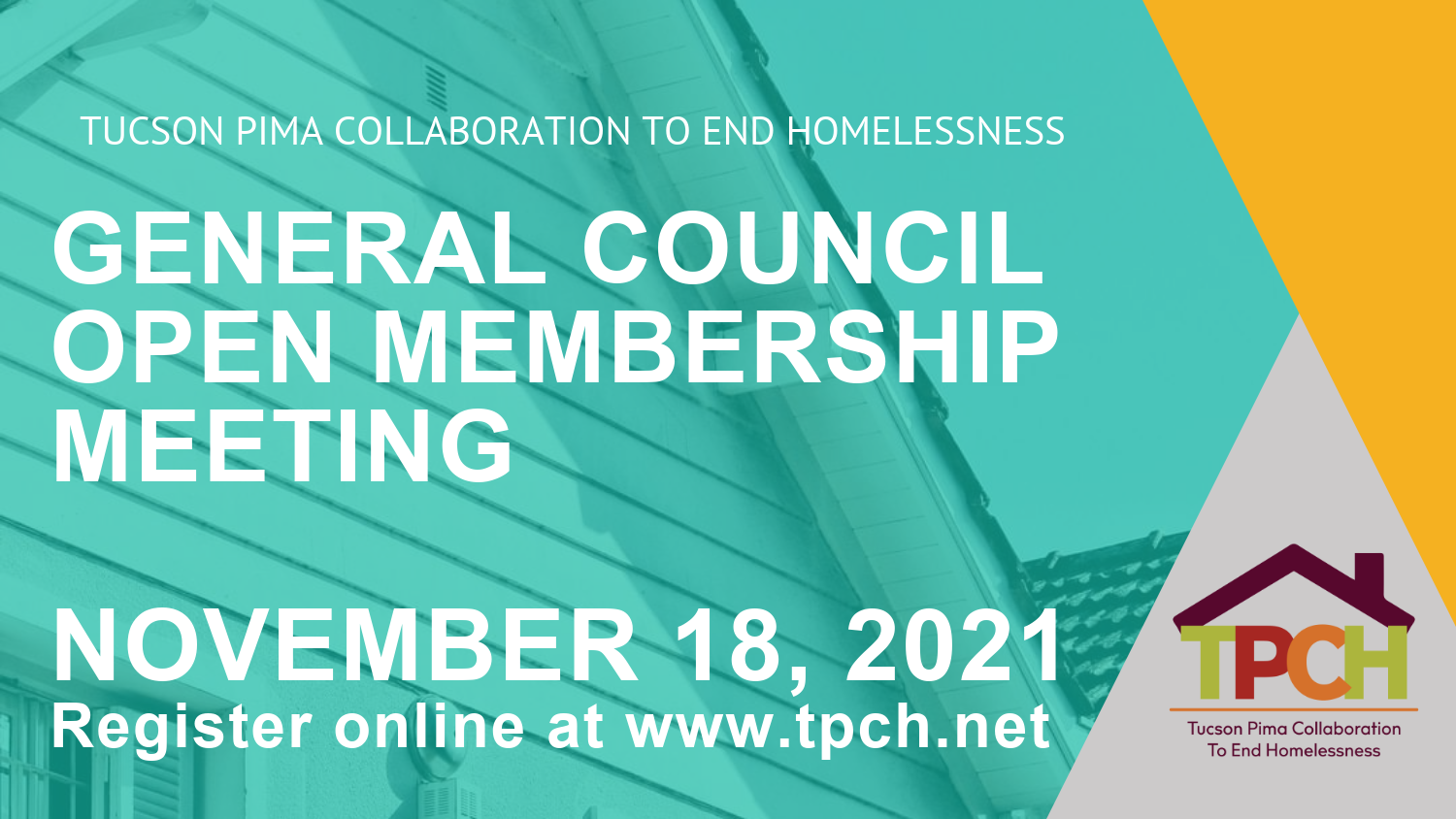
Join TPCH for our Quarterly Membership/General Council Meetings on Thursday, November 18
3pm-5pm (virtual meeting conducted using Zoom)
This meeting will be held virtually and pre-registration is required. Register online at https://us02web.zoom.us/webinar/register/WN_gV2ACiO-TE6KAG_Eu8PFHQ.
After registering, you will receive an automated email with details to access the meeting.
Summary Meeting Agenda
Community Celebrations
Facilitated by Daniela Figueroa, CoC Board Chairperson
Maintaining Momentum to End Homelessness – Introducing FUSE and House America Initiatives
FUSE presented by Margaret Adams, Corporation for Supportive Housing (CSH)
House America presented by Brandi Champion, City of Tucson Housing First Director
Quarterly Update on TPCH Activities
Presented by Karen Fogas, CoC Lead Agency (City of Tucson)
TPCH Committee and Coalition Updates
Presented by Committee and Committee Leaders
Follow the links below to download meeting agenda and materials.
Meeting Materials
TPCH General Council Meeting Agenda (November 18, 2021)
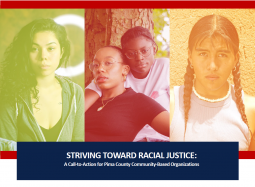
TPCH Releases “Striving Toward Racial Justice – A Call to Action” in Partnership with the University of Arizona Southwest Institute for Research on Women and City of Tucson Housing & Community Development Department
Striving Toward Racial Justice is a call to action for community-based organizations in Southern Arizona. While many organizations have made a commitment to racial justice, action has been slow to follow. Striving Toward Racial Justice offers resources and tips for local organizations to translate commitment to action and results.
Striving Towards Racial Justice is not a toolkit, nor is it a step-by-step guide.
Rather, this call to action (CTA) provides direct information on the imperative to address racial injustice, and strategies Pima County organizations can implement to address racial inequities. Organizations (inclusive of their clients, community members, staff and leadership) are best suited to determine their own best plan, and stakeholders must work collaboratively, and as equal partners. Many organizations may have already started racial justice work, but may feel that their efforts are being stalled, or that efforts have been ineffective.
Virtual Introduction to Striving Toward Racial Justice – November 30, 11am-12pm
Join TPCH and the University of Arizona Southwest Institute for Research on Women for a 60-minute virtual overview of Striving Toward Racial Justice, suggested actions, and strategies community organizations can take to advance racial justice action and results.
Register for the 60-minute CTA introduction here.
Suggested Actions
The CTA provides foundational information and strategies for local organizations to engage in 7 critical actions to advance racial justice:
Action 1 – Organization Leadership Publicly Commits to Racial Justice
Action 2 – Collective Racial Justice Work within the Organization
Action 3 – Individual Racial Justice Work
Action 4 – Determine Desired Outcomes
Action 5 – Build Racial Justice and/or Minimize Harm
Action 6 – Commit to Accountability
Action 7 – Embrace the Journey, Continue the Work
The suggested actions in Striving Toward Racial Justice may help reignite teams or provide a framework for this work. Examining and collecting data on racial disparities that may exist internally among staff and externally among client groups is a critical component of the process. However, organizations must resist becoming entrenched in the data collection and examination process. With the mass amounts of data organizations often collect, every analysis will likely lead to additional data-related questions that could delay tangible action and work.
Building on Local Efforts and Expertise
Communities in Pima county have been very fortunate to have had numerous opportunities to participate in comprehensive diversity, equity and inclusion training from national technical assistance (TA) providers. Additionally, there are numerous toolkits and other resources readily available online (many of which are recommended in the CTA). This CTA comes from within our community and is developed by people who understand our region, and all of its intricacies. These suggested strategies have been produced by people who have worked within, been clients of, and care deeply about Tucson as their home.
It is with much gratitude that we thank this powerful group of leaders for investing their time, expertise and spirit into this CTA, and the forthcoming leaders who will use this CTA to dismantle and rebuild more equitable organizations.
Special thanks to the University of Arizona Southwest Institute for Research on Women for its leadership in the creation of the CTA and to the CTA authors:
Casey Chimneystar Limón-Condit
Marisol Flores-Aguirre
Anna Harper-Guerrero
Mildred Manuel
Andrés Portela III
Claudia Powell
Claudio Rodriguez
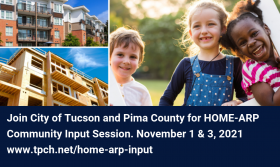
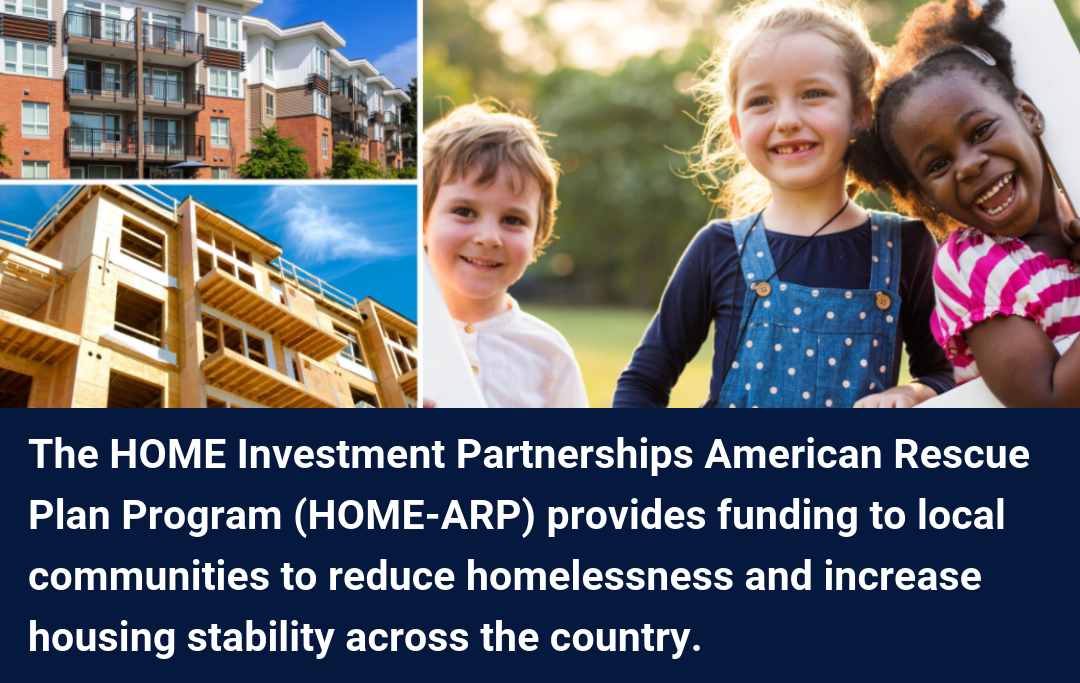
The City of Tucson and Pima County are seeking community input to discuss priority uses of $12,770,187 in HUD HOME Investment Partnerships Program – American Rescue Plan (HOME-ARP) funds. HOME-ARP funds are restricted to supporting housing, shelter and services for individuals and families who are experiencing or at risk of homelessness, fleeing or attempting to flee domestic abuse, sexual assault, stalking or human trafficking, or are extremely low-income and severely housing cost-burdened.
The City of Tucson Housing Housing and Community Development Department and Pima County Community and Workforce Development Department will host two community input forums for TPCH members and other community stakeholders.
Homeless and domestic abuse service providers, veterans’ groups, other public agencies that address the needs of housing insecure individuals and families, and organizations that address fair housing, civil rights, and the needs of persons with disabilities are encouraged to attend one of the sessions. Pre-registration is required and the sessions will be recorded.
Each session is limited to 60 attendees. To allow for maximum community participation, community members may only attend one session.
Community Input Session #1 – November 1, 2pm-3pm
Click here to register now.
Community Input Session #2 – November 3, 10am-11am
Click here to register now.
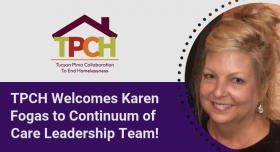

Join TPCH and the City of Tucson in Welcoming Karen Fogas to the TPCH Continuum of Care Lead Agency Team
The TPCH Continuum of Care Board and City of Tucson Housing and Community Development Department are excited to announce the hire of Karen Fogas to fill the role of Continuum of Care Project Supervisor. In her new role, Karen will lead the City of Tucson’s Continuum of Care Lead Agency team responsible for administering the Continuum of Care in partnership with the TPCH Continuum of Care Board. Karen’s first day with the City of Tucson will be November 1, 2021.
Get to Know Karen
Increasing affordable housing, helping children who live in poverty and preserving the environment for future generations are career passions for Karen Fogas. Over the course of her career, Karen has developed housing for people with disabilities for Volunteers of America, Housing Services and affordable housing for elderly through the Evangelical Lutheran Good Samaritan Society.
As Chief Program Officer for Volunteers of America, Dakotas, she oversaw Headstart programs, drop-in and adjudication programs, transitional living programs for teens exiting Department of Corrections and foster care, and work programs for people with disabilities.
As a Chief Executive Officer of the Boys and Girls Club of the Sioux Empire, Karen developed and oversaw high quality childcare, Headstart and drop in programs for 1,200 children daily.
As the Executive Director for the Tucson Audubon Society, she oversaw efforts to restore, protect and preserve habitat for Southern Arizona’s rich bird species.
Most recently, as the Chief Operations Officer at Compass Affordable Housing, Karen helped to oversee the organization’s Continuum of Care Programs programs and Eviction Prevention efforts.
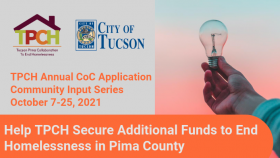
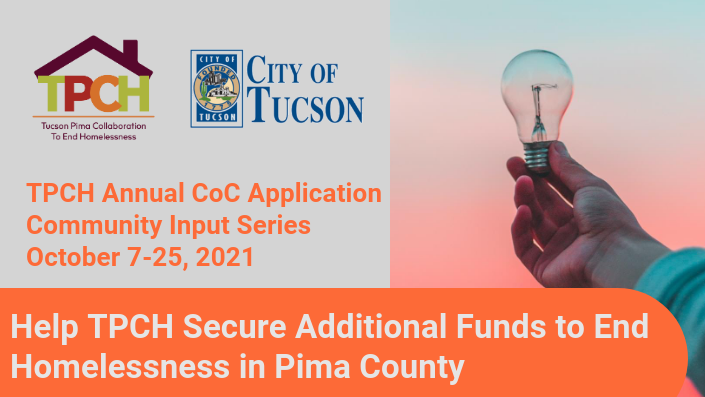
Help TPCH prepare the Continuum of Care (CoC) application for Tucson/Pima County. The CoC Application plays a critical role in our ability to retain and increase HUD funding for housing and services for people experiencing homelessness throughout Pima County. Each session will include a review of draft application sections and the opportunity to suggest improvements to our community’s funding application.
Download the full community input series schedule with topic details and registration links.
Addressing Youth and Family Homelessness: Coordination with Educational Systems and Providers (1C-4), Informing Youth and Families of Educational Rights (1C-4a)
*Included as part of regularly scheduled Homeless Youth Coalition Meeting
October 7, 2021, 3pm-5pm
System Performance – Housing: Housing First Implementation (1C-9), Improving HMIS Bed Coverage Rate (2A-5a), Reducing First Time Homelessness (2C-1), Reducing Length of Time Homeless (2C-2), Increasing Exits to Permanent Housing Destinations (2C-3), Reducing Returns to Homelessness (2C-4)
October 11, 2021, 9am-11am
Promoting Equity and Inclusion: Addressing the Needs of LGBTQ+ Persons (1C-6), Efforts to Promote Racial Equity in Homelessness (1C-15c)
*Included as part of regularly scheduled Diversity, Equity, and Inclusion Committee Meeting
October 11, 2021 1pm-2:30pm
System Performance – Employment, Income, Benefits: Promoting Attainment of Mainstream Benefits (1C-13a), Increasing Employment Cash Income (2C-5), Workforce Development and Education/Training (2C-5a), Increasing Non-Employment Cash Income (2C-5b)
October 14, 2021, 9:30am-11am
System Performance – Outreach and Coordinated Entry: Street Outreach Approaches (1C-10), Coordinated Entry System (1C-14), Adjusting Coordinated Entry to Account for Rapid Changes During COVID-19 Pandemic (1D-8)
October 18, 2021, 1pm-2:30pm
Responding to the COVID-19 Crisis: COVID-19 Safety Protocols (1D-1), Improving Readiness for Future Health Emergencies (1D-2), Coordination to Distribute ESG-CV Funds (1D-3), Coordination with Mainstream Health Resources (1D-4), Communicating Information to Homeless Service Providers (1D-5), Identifying Persons Eligible for Vaccination (1D-6)
October 21, 2021, 1pm-3pm
Addressing Domestic Violence: Training Providers to Address Needs of DV Survivors (1C-5), Using De-Identified Aggregate Data to Assess Special Needs of DV Survivors (1C-5a), DV Safety Protocols in Coordinated Entry (1C-5b), Addressing Possible Increase in DV During the COVID-19 Pandemic (1D-7), Receipt of De-Identified Aggregate Data from Comparable Database (2A-4.2), Comparable Database Bed Coverage Rate (2A-5b.1)
October 25, 2021, 1pm-3pm
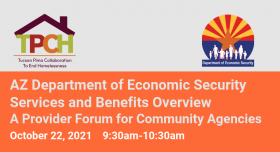
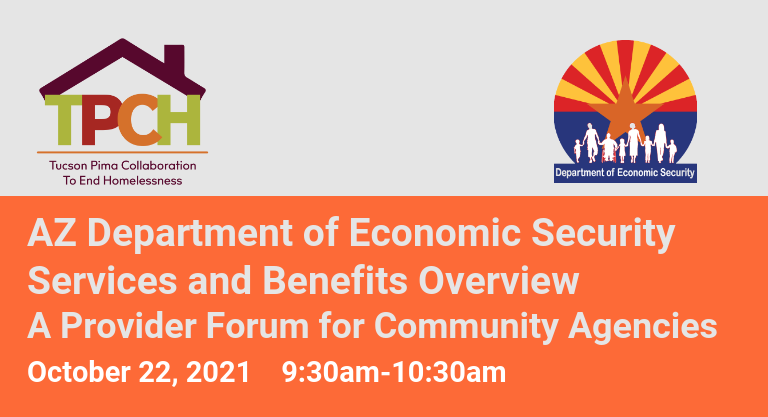
Looking to improve your ability to connect people experiencing homelessness to State benefits and social programs? Join TPCH and the Arizona Department of Economic Security for a special one-hour provider forum on OCTOBER 22, 2021- 9:30AM-10:30AM.
DES Benefits and Services: One-Hour Provider Forum
The Arizona Department of Economic Security (DES) is an integrated human services agency that provides critical protective and assistance services to Arizona’s children, adults, and families. DES has five divisions responsible to serving the community:
During this one-hour forum attendees will receive an overview of DES and the 40+ programs and services in the five divisions, plus the Arizona Early Intervention Program (AzEIP). This is an excellent introduction to the agency and an opportunity to meet the division liaisons.
This provider forum is the first in a series of Division focused dialogues related to improving coordination between homeless service providers and DES. Please join us as we work together to develop strategies to serve our community more holistically.